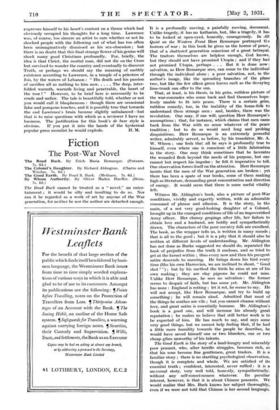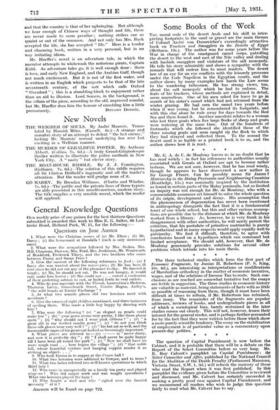Fiction
The Post-War Novel
The Good Earth. By Pearl S. Buck. (Methuen. 78. 6d.) By Whose Authority. By Oliver Madox Hueffer. (Berm. 7s. 6d.)
The Road Back cannot be treated as a "novel," an enter- taimnent ; it would be silly and insulting to do so. Nor can it be regarded as a work of art by anyone of the War generation, for neither he nor the author are detached enough. It is a profoundly moving, a painfully moving, document. Unlike tragedy, it has no katharsis, but, like a tragedy, it has to be looked at open-eyed, honestly, courageously. In All Quiet an the Western Front Herr Remarque portrayed tbe horrors of war ; in this book he gives us the horror of peace, that of a shattered generation conscious of a great betrayal. The traitors themselves are helpless enough, God knows, but they should not have promised Utopia ; and if they had not promised Utopia, perhaps . . . But it is done now : salvation, as Herr Remarque sees, can come to the individual through the individual alone ; a poor salvation, not, in the author's image, like the spreading branches of the plane tree, but like the few silken green leaves such as the decaying lime-trunk can offer to the sun.
That, at least, is his thesis, in his grim, ruthless picture of the war-comrades who come back and find themselves hope- lessly unable to fit into peace. There is a certain grim, ruthless comedy, too, in the inability of the home-folk to understand these strange men : and, besides, there was the revolution. One may, if one will, question Herr Remarque's assumptions ; that, for instance, which claims that men came back from the War with no sense whatever of the peace tradition ; but to do so would need long and probing disquisitions. Herr Remarque is an extremely powerful writer, admirably served, as before, by his translator, Mr. A. W. VVheen ; one feels that all he says is profoundly true to himself, even where one is conscious of a little fabrication in the story. One may think sometimes that he lacerates the wounded flesh beyond the needs of his purpose, but one cannot but respect his impulse : he felt it imperative to tell. One observation forces itself on the attention. Herr Remarque insists that the men of the War generation are broken : yet there has been a spate of war books, some of them ranking high as literature, demanding great concentration and direction of energy. It would seem that there is some useful vitality left.
Witness Mr. Aldington's book, also a picture of post-War conditions, vividly and expertly written, with an admirable command of phrase and allusion. It is the story, in the main, of a not very good-looking daughter of a Colonel, brought up in the cramped conditions of life of an impoverished Army officer. Her clumsy gropings after life, her failure to obtain love and a husband, are boldly and sympathetically drawn. The characters of the poor country folk are excellent. The book, as the wrapper tells us, is written in many moods ; that is all to the good ; but it is a pity that it should also be written at different levels of understanding. Mr. Aldington has not done as Burke suggested we should do, separated the husk of prejudice from the truth it encloses, and so tried to get at the kernel within ;, thus every now and then his pungent satire descends to sneering. He brings down his bird every time (like his own Harrovian, we are inclined to shout, "Good shot ' ") ; but by his method the birds he aims at are of his own making ; they are clay pigeons he could not miss. Unlike Herr Remarque, he sees no salvation : the former seems to despair of faith, but has some yet. Mr. Aldington has none : England is rotting ; let it rot, he seems to say. He will not accept, like Herr Remarque, and try to build up something ; he will remain aloof. Admitted that most of the things he scathes are vile ; but you cannot cleanse without love, and great satire is essentially humane. Mr. Aldiington's book is a good one, and will increase his already great reputation ; he makes us believe that still better work is to be expected of him. He has much to say, and says some very good things, but we cannot help feeling that, if he had a little more humility towards the people he describes, he would have saved himself one or two blunders, one or two cheap gibes unworthy of his talents.
The Good Earth is the story of a land-hungry and miserably poor peasant, who, after terrific struggles, becomes rich, so that his sons become fine gentlemen, great traders. It is a familiar story ; there is no startling psychological observation, though it is complete and whole. We are satisfied of its
essential truth ; confident, interested, never ruffled : it is a universal story, very well told, honestly, sympathetically.
without any self-consciousness whatever. Its peculiar interest, however, is that it is about Chinese peasants. We would realize that Mrs. Buck knows her- subject thoroughly, even if we were not told that Chinese is her second language, and that the country is that of her upbringing. But although we hear enough of Chinese ways of thought and life, these arc never made to seem peculiar ; nothing strikes one as quaint or out of the common. And not only has Mrs. Buck accepted the life, she has accepted "life." Hers is a tender and charming book, written in a very personal, but in no way irritating idiom.
Mr. Hueffer's novel is an adventure tale, in which the narrator attempts to whitewash the notorious pirate, Captain Iiidd. As adventure tales go, it is well enough done : there is love, and early New England, and the Arabian Gulf, though not much excitement. But it is not of the first water, and is written in an English which purports to be that of the late seventeenth century, of the sort which calls Oxford " Oxenford " ; this is a stumbling-block to enjoyment rather than an aid to illusion. Lord Somers, in the background, is the villain of the piece, according to the old, unproved scandal, but Mr. Hueffer does him the honour of ennobling him a•little





































 Previous page
Previous page